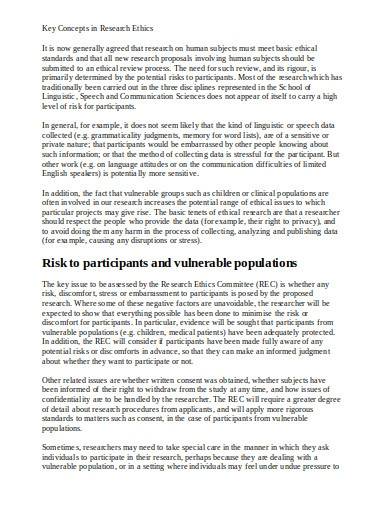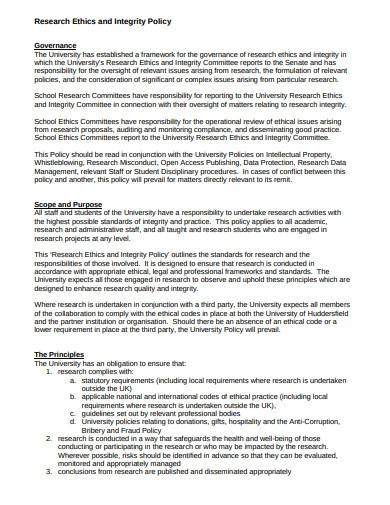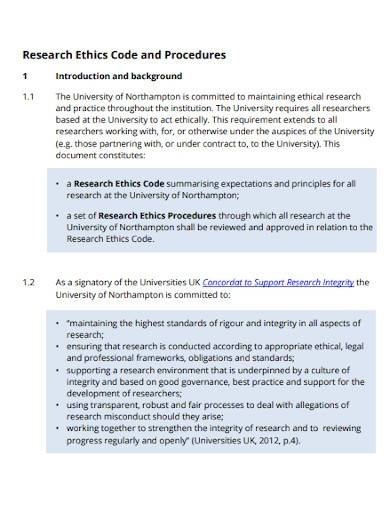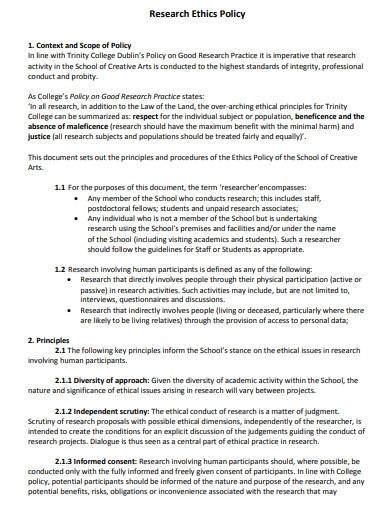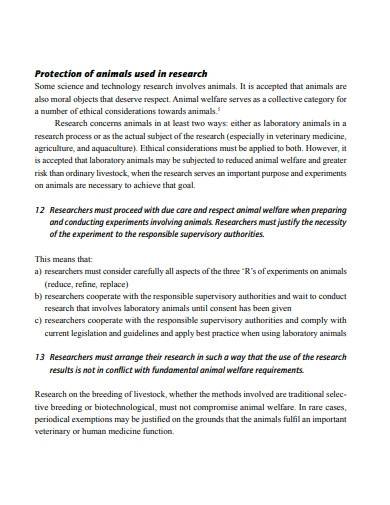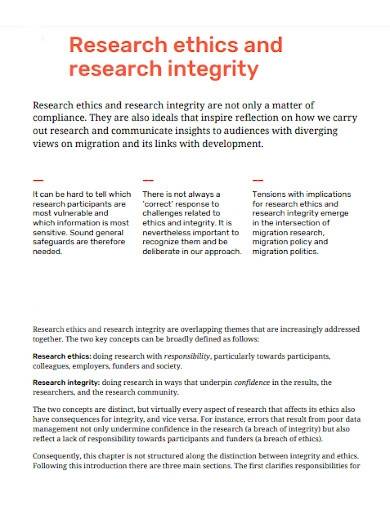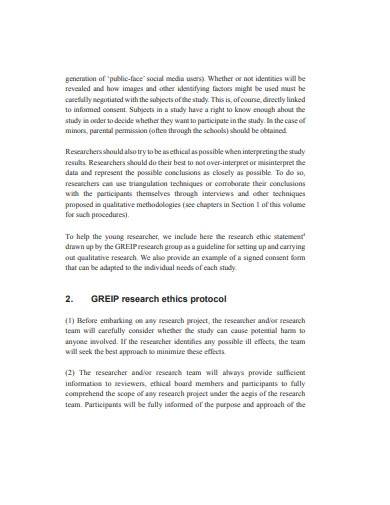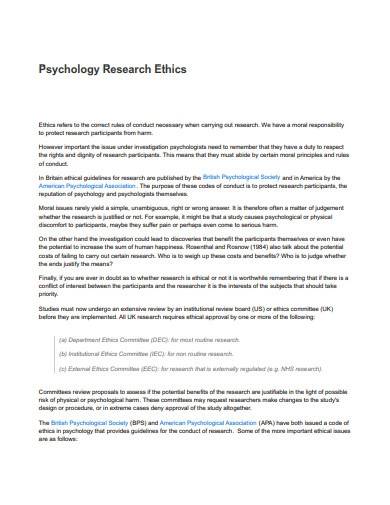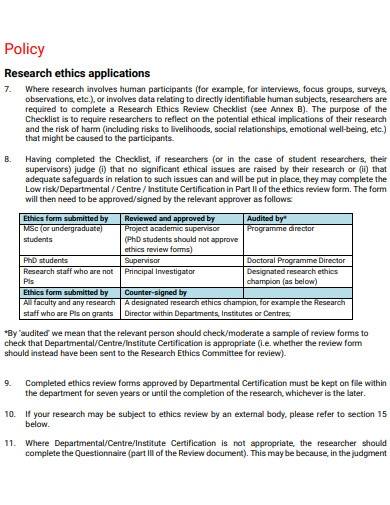Ethics are moral principles of right and wrong. It governs how an individual should behave and conduct themselves in society. The application of ethical principles cover a huge scope including academics, business, and research. Research ethics are important principles that guide researchers on doing the right things on their respective field. There is a good reason for putting ethics in research and you are about to find that out.
FREE 10+ Research Ethics Samples & Templates
1. Research Ethics Template
2. Research Ethics and Integrity Policy
3. Research Ethics Code and Procedures
4. Standard Research Ethics Policy Template
5. Code of Conduct on Research
6. Clinical Research Ethics Format
7. Research Ethics and Research Integrity
8. Basic Research Ethics Template
9. Psychology Research Ethics
10. Research Ethics Applications Policy
11. Economic Research Ethics
What Is Research Ethics?
Research ethics is beneficial both to the researcher and their human subject. That is because research ethics guides researchers on the right thing to do at the right time. Following ethical standards for research is crucial for maintaining research integrity. On the other hand, human subjects benefit from ethical research through ethical consideration. Participating in a research study as a human subject is risky. A lot of these subjects end up in a really bad condition or even die. Research ethics protect human subjects from ending in such fate. Through ethical consideration, like informed consent, they can decide whether to participate in the research study or refuse it.
Research ethics is important because it helps in expanding knowledge. Expanding knowledge is the aim of any research study as it leads to new discoveries and innovations for that field. Research ethics also values mutual respect and fairness, which is essential when doing collaborations during scientific research. With research ethics in place, researchers are not only guided with the right thing to do, but it also holds them accountable for their actions. It ensures that no harm is done to others and let the public know that they can trust research. And through research ethics, research money or funds are spent appropriately.
How to Practice Ethical Research Principles
Ethical research should not only be in writing, but it must also be put into action. It’s pretty easy to read and utter the ethical research principles, but it will be of no use if it isn’t practiced on an actual research study. So, here’s a little something that will help you put your knowledge of ethical principles to good use.
1. Confidentiality
The identity of a research participant or subject must be kept confidential. It should not be openly provided in public discussions, especially when research is about finding a treatment or cure to a certain disease or illness. Researchers must respect and protect sensitive information that is entrusted to them by the participants.
2. Informed Consent
Research and experiments should only be conducted with informed consent. Informed consent is permission granted by an individual after learning about the possible pros and cons of a particular procedure. Doctors in hospitals also practice informed consent before any non-emergency medical procedure.
3. Plagiarism
Plagiarism is the act of copying someone’s work or ideas and claiming it as yours. It is never considered good practice in any field. Research studies must be published for the sake of expanding knowledge, and not to advance one’s career. Simply put, only publish new research work, and not any mere duplicate.
4. Honesty and Integrity
Honesty in research means reporting only the research facts. That includes the methods used in conducting research experiments and the actual result of your research. The data presented in your research study must not be made up to please the public or make people believe that your research is a success.
5. Care for Animals
Animals that are used in experiments must be properly cared for. Only conduct animal experiments using carefully designed experiment methods, and only when it is necessary. The most important thing as a researcher is that you should always show respect to animals or any living thing.
FAQs
What are the five principles of research ethics?
The first principle of research ethics is minimizing the risk of any form of harm. As much as possible, every researcher must keep in mind to hold research and experiments without harming their subjects or participants. The second principle is about obtaining informed consent. As explained above, research and experiments should only be done after securing informed consent from the participant or subject. Informed consent aims to let participants know what the research is about and what they are required to do in it. The third principle is maintaining confidentiality. This means that the participant’s identity should be protected and kept confidential for their safety and privacy. They must be kept anonymous at all times. The fourth principle is avoiding deception. This takes us back to informed consent, where participants must be informed of the research to be conducted. And the fifth principle of research ethics is allowing a participant to withdraw. Any participant in a research study must be given the right to withdraw from any stage of the research process.
What is the Nuremberg Code?
The formulation of the Nuremberg Code was inspired by the terrible experiments that were conducted by the Nazis during World War II. The code is used to show that researchers are committed to respecting every research participant. It addresses issues like experiments causing severe injury or death, if the experiment has any therapeutic claims and allowing participants to decide whether to participate or not.
There are only two outcomes of a research experiment, and that is to save a life or cause death. It all depends on how a researcher practices the principles of research ethics. Feel free to browse through the research ethics samples and templates for different fields of work provided above. You can also download them for free.
Related Posts
FREE 10+ Concurrent Validity Samples & Templates in MS Word | PDF
FREE 10+ Resource Tracking Samples & Templates in MS Word | PDF
FREE 4+ Clinical Case Study Samples & Templates in PDF
FREE 10+ Content Validity Samples & Templates in PDF
FREE 10+ Construct Validity Samples & Templates in MS Word | PDF
FREE 10+ Code of Human Research Ethics Samples & Templates in MS Word | PDF
FREE 10+ Biography Research Report Samples and Templates in PDF
FREE 10+ System Documentation Samples & Templates in MS Word | PDF
FREE 10+ Process Document Samples & Templates in MS Word | PDF
FREE 10+ Action Research Samples & Templates in PDF
FREE 10+ Longitudinal Research Samples & Templates in PDF | MS Word
FREE 10+ Causal Research Samples & Templates in MS Word | PDF
FREE 10+ Client Discovery Samples & Templates in MS Word | PDF
FREE 10+ Null Hypothesis Samples & Templates in MS Word | PDF
FREE 9+ Product Knowledge Samples & Templates in PDF

